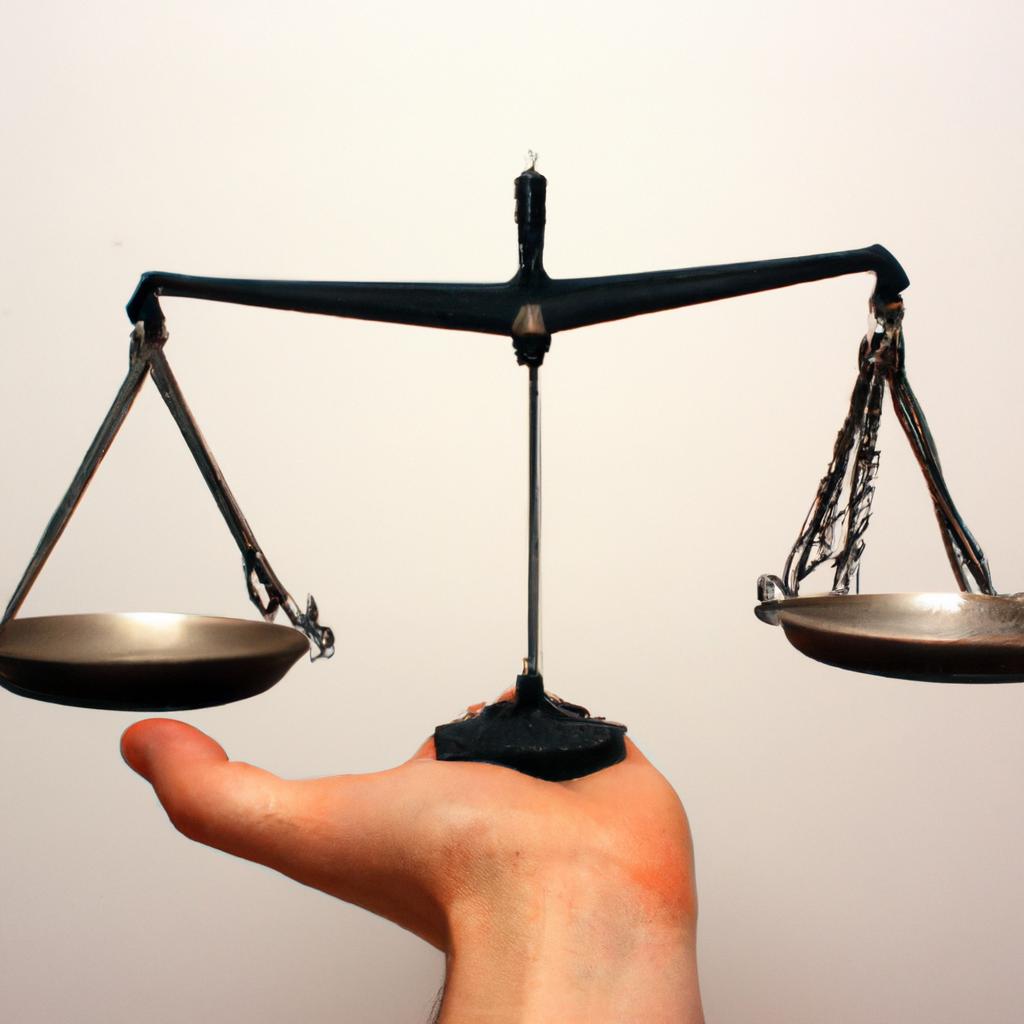In the era of digital media and instant information, the accuracy and ethics of news media journalism have become increasingly crucial. The dissemination of reliable and trustworthy news has a profound impact on society at large, shaping public opinion, influencing decision-making processes, and holding individuals accountable. For instance, consider a hypothetical scenario where a major news outlet publishes an article with inaccurate information about a political candidate’s alleged involvement in illegal activities. This false narrative could not only damage the reputation and career prospects of the individual implicated but also mislead citizens who rely on such news sources for making informed choices.
Ensuring accuracy in news reporting is paramount to maintaining journalistic integrity. Journalists are entrusted with the responsibility of delivering factual information that reflects reality as objectively as possible. However, achieving absolute precision can be challenging due to numerous factors such as limited access to primary sources, time constraints, biases, or even intentional misinformation campaigns. Nonetheless, journalists must strive to verify facts through multiple credible sources before publishing any story. Furthermore, ethical considerations play a significant role in determining what information should be reported and how it should be presented to ensure fairness and avoid harm caused by sensationalism or perpetuation of stereotypes. Consequently, understanding the interplay between accuracy and ethics becomes imperative in navigating the complex landscape of modern journalism.
To address this challenge, news outlets can implement various strategies. First and foremost, investing in thorough fact-checking processes is essential. This includes cross-referencing information from multiple sources, consulting experts or witnesses, and scrutinizing data for accuracy and reliability. Additionally, promoting transparency by providing clear attributions and citations allows readers to assess the credibility of the information themselves.
Furthermore, news organizations should encourage diversity and inclusion within their staff to minimize biases and promote a broader range of perspectives. This can help prevent the propagation of false narratives or misrepresentation of marginalized groups. Implementing editorial guidelines that prioritize accuracy over speed can also mitigate the pressure to publish hastily without adequate verification.
In terms of ethics, journalists must adhere to professional codes of conduct that prioritize truth-telling, accountability, and minimizing harm. This involves avoiding conflicts of interest, disclosing potential biases or affiliations when relevant, respecting privacy rights, and seeking consent when reporting on sensitive topics.
Additionally, fostering a culture of critical thinking among media consumers is crucial. Educating the public about media literacy skills enables individuals to discern reliable sources from misinformation or propaganda. Fact-checking websites and initiatives such as media literacy campaigns can provide valuable tools for citizens to verify information independently.
In conclusion, ensuring accuracy and ethical journalism requires a multi-faceted approach involving both news organizations and individual consumers. By prioritizing fact-checking procedures, promoting diverse perspectives within newsrooms, adhering to ethical guidelines, and educating the public about media literacy skills, we can work towards a more trustworthy and accountable media landscape in our digital age.
Role of Accuracy in News Reporting
In the ever-evolving world of news media, accuracy plays a pivotal role in maintaining credibility and trust among readers. Ensuring accurate reporting is not only an ethical obligation but also essential for upholding the integrity of journalism. This section examines the significance of accuracy in news reporting, using real-life examples to illustrate its impact on public perception.
The Importance of Accuracy:
One notable example that highlights the importance of accuracy in news reporting is the case of Jayson Blair, a journalist who fabricated stories while working at The New York Times. Blair’s deceitful actions not only tarnished his own reputation but also led to widespread skepticism towards mainstream media outlets. Such incidents serve as a stark reminder that even one instance of inaccurate reporting can undermine the credibility built over years by reputable organizations.
To further underscore this point, consider the emotional response evoked by these bullet points:
- Misleading information can lead to individuals making ill-informed decisions with potentially disastrous consequences.
- Inaccurate reporting can perpetuate harmful stereotypes and biases, leading to social division and unrest.
- Journalistic errors erode public trust and confidence in news sources, undermining democracy itself.
- Factually incorrect news reports have detrimental effects on individuals’ mental wellbeing and overall quality of life.
Furthermore, let us examine this table which presents additional evidence regarding the repercussions of inaccurate reporting:
| Consequences | Examples |
|---|---|
| Legal implications | Libel cases against journalists |
| Economic impacts | Losses faced by affected businesses |
| Social ramifications | Riots or protests stemming from misinformation |
| Personal harm | Emotional distress experienced by victims mentioned in false narratives |
Ensuring accuracy in news reporting goes beyond mere professional responsibility; it safeguards democratic values and promotes informed decision-making within society. By recognizing past instances where inaccuracies have had far-reaching consequences, we must emphasize the significance of fact-checking and meticulous research in journalism. With this understanding, the subsequent section will delve into the importance of fact-checking as an essential step in maintaining accuracy and ethical standards in news reporting.
Importance of Fact-Checking in Journalism
Having established the crucial role accuracy plays in news reporting, it is imperative to delve into the significance of fact-checking within journalism. To illustrate this point further, let us consider a hypothetical scenario where a news outlet publishes an article claiming that a prominent public figure has been involved in illicit activities. This information spreads rapidly across various platforms and influences public opinion negatively towards the individual. However, later investigations reveal that the initial report was based on unsubstantiated rumors and false evidence. Such instances underscore the need for rigorous fact-checking protocols in journalism.
Paragraph 1:
Effective fact-checking serves as a safeguard against misinformation and ensures that journalists adhere to professional standards when disseminating information. By thoroughly investigating claims before publication, journalists can minimize errors and prevent potentially damaging inaccuracies from reaching the public sphere. Furthermore, fact-checking allows reporters to corroborate sources, assess their credibility, and verify facts through multiple channels. In doing so, journalists enhance the reliability of their reports while fostering trust with their audience.
Paragraph 2:
To emphasize the importance of fact-checking in journalism, consider the following bullet points:
- Promotes accountability: Fact-checking holds both journalists and news organizations accountable for the information they present to audiences.
- Safeguards democracy: Accurate reporting facilitated by robust fact-checking helps protect democratic processes by providing citizens with reliable information necessary for making informed decisions.
- Counters disinformation campaigns: Fact-checking actively combats deliberate attempts to spread false narratives or manipulate public sentiment through misinformation.
- Supports media literacy: Engaging in thorough fact-checking practices encourages media literacy among consumers who may learn to discern accurate sources from dubious ones.
Paragraph 3:
Additionally, incorporating tables into journalistic pieces can effectively convey complex data or comparisons succinctly. Consider Table 1 below which illustrates how different news outlets approached fact-checking during a significant event:
Table 1: Approach to Fact-Checking during Event X
| News Outlet | Extensive Fact-Checking | Superficial Fact-Checking | No Fact-Checking |
|---|---|---|---|
| A | ✔️ | ||
| B | ✔️ | ||
| C | ✔️ |
The table clearly demonstrates the contrast in fact-checking approaches among various news outlets. Such visual representations can effectively evoke an emotional response, emphasizing the crucial role of accuracy and fact-checking within journalism.
By recognizing the significance of accurate reporting and rigorous fact-checking processes, journalists can fulfill their ethical responsibilities. Understanding these responsibilities is vital for maintaining journalistic integrity in today’s media landscape.
Ethical Responsibilities of Journalists
In an era of rapidly spreading information, the accuracy and reliability of news media have become paramount. Journalists play a crucial role in ensuring that factual information reaches the public, allowing individuals to form informed opinions and make well-founded decisions. To achieve this, fact-checking has emerged as a vital practice within journalism. By scrutinizing claims made by sources and verifying their veracity, journalists can uphold the integrity of their profession and maintain public trust.
To illustrate the significance of fact-checking, let us consider a hypothetical scenario: A news outlet publishes an article claiming that a new study suggests a correlation between excessive smartphone use and mental health issues among teenagers. This story quickly gains traction on social media platforms, sparking widespread concern among parents and educators alike. However, upon further investigation by diligent fact-checkers, it is revealed that the study was flawed due to methodological shortcomings and exaggerated conclusions. Consequently, through meticulous fact-checking procedures, journalists can prevent misinformation from circulating widely and potentially causing harm.
The practice of fact-checking holds several advantages for both journalists and society at large:
- Enhancing credibility: By diligently verifying facts before publication, journalists establish themselves as reliable sources of information.
- Counteracting disinformation: In an age where false narratives can spread rapidly online, fact-checking serves as a significant deterrent against the dissemination of misleading or inaccurate content.
- Fostering transparency: Through rigorous fact-checking processes, journalists demonstrate their commitment to providing accurate information to the public.
- Promoting accountability: Fact-checking enables journalists to hold powerful entities accountable for their statements or actions.
Table: Impacts of Fact-Checking in Journalism
| Advantages | Explanation |
|---|---|
| Enhancing credibility | Establishes journalists as trustworthy sources |
| Counteracting disinformation | Serves as a deterrent against spreading misleading or inaccurate content |
| Fostering transparency | Demonstrates commitment to delivering accurate information |
| Promoting accountability | Enables holding powerful entities accountable for their statements or actions |
By embracing the practice of fact-checking, journalists can maintain the integrity and reliability of news media. This ensures that readers receive accurate information necessary for making informed decisions in various aspects of life. The next section will delve into another crucial aspect of journalism: maintaining objectivity in news coverage.
Maintaining Objectivity in News Coverage
Transitioning from the previous section on ethical responsibilities, it is crucial for journalists to also maintain objectivity in their news coverage. This ensures that the information presented to the public is fair and unbiased. To illustrate this point, let’s consider a hypothetical scenario where two newspapers report on a political event.
Newspaper A provides an objective account of the event, presenting facts without any personal bias or agenda. It offers multiple perspectives, quotes various individuals involved, and investigates claims made by different parties. On the other hand, Newspaper B takes a subjective approach, favoring one particular side over others. It selectively presents information that supports its own narrative while dismissing contradictory evidence. In doing so, Newspaper B compromises its journalistic integrity and risks misleading its readerships.
Maintaining objectivity in news coverage is essential for several reasons:
- Promoting trust: By providing balanced reporting, journalists build credibility with their audience and foster trust in their work.
- Ensuring informed decisions: Objectivity allows readers to form independent opinions based on all available information rather than being swayed by biased interpretations.
- Preserving democracy: Objective journalism serves as a watchdog against abuses of power and helps hold authorities accountable.
- Avoiding harm: Unbiased reporting reduces the potential harm caused by misinformation or propaganda spread through media channels.
To further emphasize the significance of maintaining objectivity, we can refer to the following table:
| Benefits of Objective Journalism |
|---|
| Promotes Trust |
While these points highlight some key advantages of objective news coverage, it is important to acknowledge that achieving complete objectivity may be challenging due to inherent human biases. Nevertheless, journalists should strive towards minimizing personal influence in their reporting and diligently fact-check information before publishing it.
With an understanding of how maintaining objectivity enhances journalistic ethics established, we now turn our attention to examining the implications of inaccurate reporting.
Implications of Inaccurate Reporting
In the fast-paced world of news media, accuracy and ethics play a crucial role in maintaining the trust between journalists and their audience. When inaccurate information is disseminated, it can have serious implications for both individuals and society as a whole. This section will explore some of the key ramifications that arise from inaccurate reporting.
One example that highlights the consequences of inaccurate reporting is the case of a major newspaper falsely accusing an individual of committing a heinous crime. The publication’s rush to be the first to break the story led to incomplete fact-checking, resulting in irreparable damage to the person’s reputation. Such instances not only harm innocent individuals but also erode public confidence in journalism.
The implications of inaccurate reporting are far-reaching and extend beyond personal reputations. They include:
- Misinformation spreading rapidly through social media platforms, leading to widespread confusion among readers.
- Public perception being influenced by false narratives, which can exacerbate societal divisions.
- Distrust towards news outlets increasing, making it difficult for audiences to discern accurate information from misinformation.
- Loss of faith in journalism as a democratic safeguard against abuses of power.
To further emphasize these implications, consider the following table showcasing real-world examples:
| Case Study | Consequences |
|---|---|
| False medical breakthrough reported | Potential harm caused by reliance on unverified treatments |
| Politician falsely accused of corruption | Damage to political career and public trust |
| Incorrect financial advice given | Economic losses suffered by those who followed flawed guidance |
| Misreported election results | Undermined legitimacy of electoral process |
These examples demonstrate how inaccuracies in news coverage can have severe repercussions on various aspects of society. It is therefore imperative for journalists and media organizations to prioritize accuracy and fact-checking procedures rigorously.
By acknowledging these issues within the industry and actively striving for greater transparency and accountability, news media can begin rebuilding trust with consumers. The subsequent section will delve into the crucial steps that can be taken to foster a healthy relationship between journalists and their audience, thereby ensuring the dissemination of accurate and ethical reporting.
Building Trust with News Consumers
In the realm of news media, accurate reporting plays a pivotal role in maintaining public trust and upholding journalistic ethics. When inaccurate information is disseminated to the public, it can have far-reaching implications that extend beyond mere factual errors. This section explores some of these implications through an examination of a hypothetical case study involving a major news outlet.
Imagine a prominent news organization publishes an article containing false information about a political candidate during an election campaign. The inaccuracies presented in this report could potentially sway public opinion and influence voters’ decisions based on incorrect or misleading facts. As a result, the candidate’s reputation may be tarnished unfairly, leading to undeserved consequences for their campaign.
The repercussions of such inaccuracies are not limited solely to the subjects directly involved; they also impact the broader society and democratic processes at large. Here are some key points to consider:
- Eroding Public Trust: Inaccurate reporting undermines public confidence in the news media industry as a whole. If individuals repeatedly encounter falsehoods or misinformation from trusted sources, skepticism towards all forms of journalism may increase.
- Polarization and Division: False narratives perpetuated by inaccurate reporting can contribute to societal polarization and division. Misleading information often fuels existing biases and prejudices, exacerbating social tensions and hindering constructive dialogue.
- Manipulation of Public Opinion: Those who engage in deliberate dissemination of false information can manipulate public sentiment for personal gain or ideological purposes. This manipulation erodes citizens’ ability to make informed choices based on reliable facts.
- Damage to Democracy: Inaccurate reporting weakens democracy by impeding citizens’ access to truthful information necessary for effective decision-making. A misinformed electorate may struggle to hold elected officials accountable or participate meaningfully in civic processes.
To further understand the impacts of inaccurate reporting, let us examine how various stakeholders are affected using the following table:
| Stakeholder | Impact |
|---|---|
| General Public | Loss of trust in news media |
| Political Figures | Reputation damage, potential electoral loss |
| Society | Increased polarization and social divisions |
| Democracy | Weakening of informed decision-making process |
In conclusion, the implications of inaccurate reporting extend far beyond mere factual errors. They have the potential to erode public trust, fuel societal division, manipulate public opinion, and undermine democratic processes. It is imperative for journalists and news organizations to prioritize accuracy and ethics to maintain their role as reliable sources of information in today’s media landscape.




